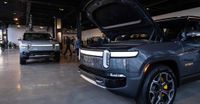Rivian Automotive, the electric vehicle manufacturer, reported on May 6, 2025, that it has exceeded Wall Street's expectations for the first quarter of the year while also confirming its earnings targets for 2025. However, the company has adjusted its forecasts for vehicle deliveries and capital spending downward due to the ongoing impact of tariffs imposed during President Donald Trump's administration.
Despite producing all of its trucks and SUVs domestically at its Illinois factory, Rivian acknowledged that it is "not immune to the impacts of the global trade and economic environment." In a quarterly letter to shareholders, the company expressed concerns about the current global economic landscape, stating, "the significant uncertainty, particularly regarding evolving trade regulation, policies, tariffs, and the overall impact these items may have on consumer sentiment and demand" could affect its operations.
Rivian's Chief Financial Officer, Claire McDonough, indicated that the company anticipates incurring additional costs of "a couple thousand dollars" per vehicle due to tariffs, including a 25% tariff on imported auto parts that do not comply with the U.S.-Mexico-Canada trade agreement.
As a result, Rivian's revised guidance now includes expected deliveries of between 40,000 and 46,000 units for the year, a decrease from the previous range of 46,000 to 51,000 units. Additionally, the company has raised its capital expenditure forecast to between $1.8 billion and $1.9 billion, up from a prior estimate of $1.6 billion to $1.7 billion.
Despite these challenges, Rivian reaffirmed its plans to achieve a "modest positive gross profit" this year, as well as projected losses between $1.7 billion and $1.9 billion on an adjusted basis before interest, taxes, depreciation, and amortization. The company reported a loss of 41 cents per share, which was better than the 76 cents expected by analysts, and revenues of $1.24 billion, surpassing the anticipated $1.01 billion.
In a promising sign for Rivian, the automaker achieved its second consecutive quarter of gross profit, recording $206 million during the first quarter, up from $170 million in the previous quarter. This success was partly attributed to an expected $1 billion investment from Volkswagen Group as part of their joint venture, Rivian and VW Group Technology LLC, which was established last year through a $5.8 billion deal.
Rivian ended the first quarter with $8.5 billion in liquidity, including $7.2 billion in cash, cash equivalents, and short-term investments. The company also benefited from an increase in sales of automotive regulatory credits, which brought in $157 million, and a significant rise in software and services revenues, totaling $318 million compared to $88 million a year earlier.
On an unadjusted basis, Rivian narrowed its losses to $541 million in the first quarter, compared to approximately $1.5 billion during the same period last year and $743 million in the fourth quarter. The company produced 14,611 electric delivery vans and "R1" SUVs and pickup trucks during the first quarter, delivering 8,640 vehicles.
Looking ahead, Rivian anticipates lower production in the second half of the year as it plans to idle and retool its Illinois plant for about a month in preparation for its new "R2" product, a smaller SUV priced at approximately $45,000. This vehicle is expected to enter production in the first half of next year, and Rivian hopes it will help reinvigorate demand amid rising costs.
Rivian's situation reflects broader industry challenges, as its competitor Lucid Group also reported mixed first-quarter results on the same day. Lucid reaffirmed its production guidance for 2025 of around 20,000 vehicles and capital expenditures of $1.4 billion. The company reported a loss of 20 cents per share, slightly better than the expected loss of 23 cents, and revenue of $235 million, which fell short of the anticipated $249 million.
As Rivian navigates these turbulent waters, it is clear that the impact of tariffs and changing economic conditions is reshaping the landscape for electric vehicle manufacturers. Rivian's CEO, RJ Scaringe, emphasized that the company is restructuring its supply chain to manage increased costs caused by tariffs and that the consumer market is becoming increasingly sensitive to price changes. "Customers are holding back on bigger investments and are more price-conscious than in the past," he noted.
Rivian's stock experienced a slight decline of 1.5% in after-hours trading following the announcement, a reflection of the cautious market sentiment surrounding the electric vehicle sector. In contrast, shares of Lucid rose 1.3% after their results were released.
Amid these adjustments, Rivian's commitment to invest $120 million to encourage suppliers to locate near its Illinois factory signals its strategy to mitigate supply chain disruptions and manage costs more effectively. The company is also stockpiling EV batteries from Asian suppliers to ensure continuity in production despite the tariff-related uncertainties.
As the electric vehicle market continues to evolve, Rivian's ability to adapt to these challenges will be crucial in maintaining its position and achieving its long-term goals. The industry is at a pivotal moment, and how companies like Rivian respond to these pressures will likely shape the future of electric mobility.





